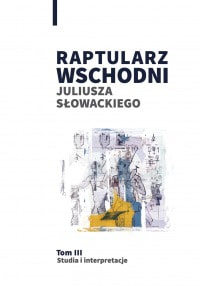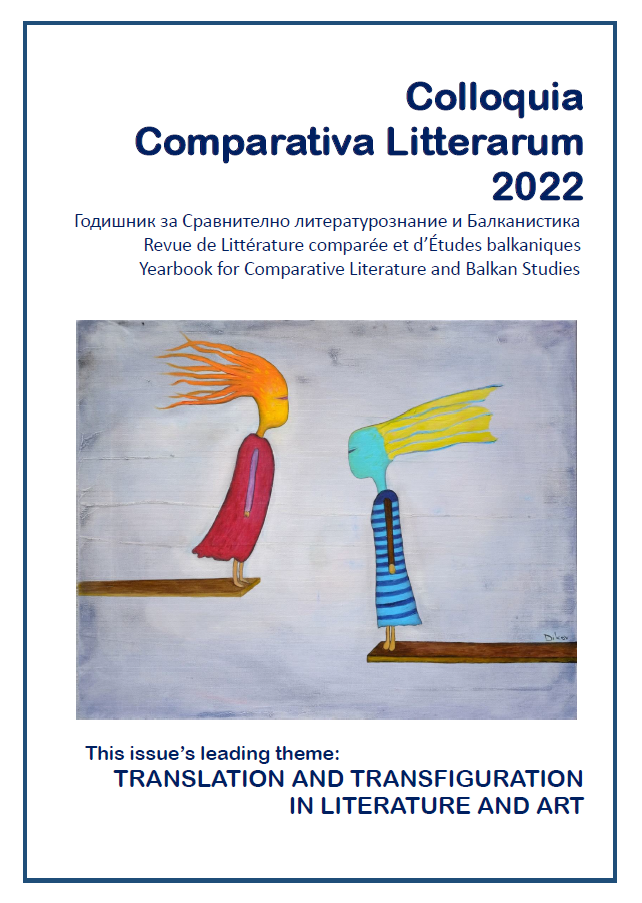RESEARCH PROJECT
Juliusz Słowacki's rediscovered notebook of the journey to the East as a Romantic syncretic work and a literary and iconographic source for research on the 19th century history and culture
Odnaleziony raptularz Juliusza Słowackiego z podróży na Wschód jako romantyczne dzieło synkretyczne oraz źródło literackie i ikonograficzne do badań nad historią i kulturą XIX wieku
|
"Pisanie na piasku. Niehegemoniczny konstrukt Orientu w Raptularzu Juliusza Słowackiego” [“Writing on the sand. Non-hegemonic construct of the Orient in Juliusz Słowacki's travelogue”], Raptularz wschodni Juliusza Słowackiego. Edycja – studia – komentarze, vol. 3: Studia i interpretacje, Maria Kalinowska, Elżbieta Kiślak, Zbigniew Przychodniak (eds.), Warszawa: Wydział „Artes Liberales” Uniwersytetu Warszawskiego – Wydawnictwo DiG – Centrum Polsko-Rosyjskiego Dialogu i Porozumienia – Uniwersytet Mikołaja Kopernika w Toruniu, 2019, p. 425-440. ISBN (all volumes): 978-83-286-0101-7; ISBN (vol. 3): 978-83-286-0104-8
Juliusz Słowacki was responsible, among his other achievements, for building up the fame of Wacław Rzewuski, an early explorer of central Arabia. Himself, he also travelled to the East, yet without equalling either the daring or the Orientalist competence of Rzewuski. Nonetheless, his travelogue from the journey to Egypt, Syria and Palestine is a testimony of a longing for Arabia. Unable to penetrate it, Słowacki tried to build up an image of the Wahhabi movement through a poetic extrapolation of the scarce notices he could gather. The sketches included in the private notebook of the poet, recently rediscovered in a library in Russia, may be interpreted in the categories of a non-hegemonic construct of the Orient. Politically disinherited as a Pole at the time of the partition of the country, Słowacki may hardly be seen as a representative of a European power; he is powerless also in cognitive terms, lacking linguistic skills and cultural competence he attributed to Rzewuski, certainly with a great deal of awe and envy. His vision is tainted with the painful consciousness of his limited insight into the Arab world, exposing obscurity, ignorance and incompetence as the traits defining the condition of the (minor) European in confrontation with the Orient. |
Słowacki doświadcza zatem w Oriencie specyficznych rodzajów niewiedzy i daje jej świadectwo w swoim notatniku podróżnym – poprzez poetycką elipsę, fragmentaryczność czy rezydualność (szczątkowość i śladowość) zapisu drobnych, codziennych wydarzeń, a może przez sam akt zastąpienia słowa przez obraz, szkic, nieukończony zarys, fragment widoku, niewyraźną linię. Wyłaniają się tu dwa komplementarne procesy: jeden z nich polega na zaskakującym rozpoznawaniu, natrafianiu na pojedyncze punkty odniesienia w nierozpoznanej jako całość, labiryntowej przestrzeni. Są to punkty zarazem istniejące na kulturowej mapie, jak też właśnie na tej mapie konotujące lokalizację misterium tremendum i wiążącego się z nim niewysłowienia. Pomyślmy, co oznacza na przykład Grób Pański – i miejsce obdarzone jasnym znaczeniem, i konfrontację z centralną tajemnicą organizującą cały układ kulturowych odniesień. Nocne czuwanie w tym miejscu służy spotęgowaniu potencjału pierwiastka ciemności, duchowej dezorientacji, przeważa szalę na korzyść niewiedzy i niewysłowenia.
a romantic travelogueIn the global scale, Juliusz Słowacki (1809-1849) may appear as a minor figure of the European Romanticism. Not as such, of course, in the Polish national consciousness, counting him, together with Mickiewicz and Krasiński, among our "Three Bards", or the national "soothsayers" ("trzech wieszczów"). Against the background of his time and place, he distinguished himself not only as a great poet, but also as a great traveller and an "opener of horizons", contributing to what we like to call the "Polish description of the world" ("polskie opisanie świata"). Having spent his youth in Kremenets (Polish Krzemieniec) and Vilnius, and having participated in the November 1830 uprising, he started his life of an itinerant émigré, firstly in France and Switzerland. In 1836-1837, he travelled to Italy, Greece and thus to the Near East: Egypt, Palestine and Syria.
The recent (re)discovery of his notebook containing a travelogue to the Near East, allegedly destroyed or lost during the war, has been a great event among the Polish scholars, specially those specialized in the Romanticism. Personally I believe that it also offers a great occasion to rethink the inscription of the Polish culture into larger horizons of cross-cultural encounters -- a perspective that is still missing in the dominating perception, accentuating the idiosyncratic character of Polish national destiny and culture. In a cross-cultural perspective, his travelogue exemplifies, in my opinion, a non-hegemonic insight into the Orient and a non-hegemonic contribution to the process of developing Oriental stereotypes. It is thus pertinent to ask how this insight, conditioned by ignorance, zones of darkness and lack of understanding, that I see, after Agamben, as defining, completes the hegemonic, apparently competent, secure visions produced by those travellers who encountered the Near East as the representatives of the European empires. The position of the Polish émigré differs radically from any colonial stance, because the mental background against which all the oriental experiences are drawn is the incessant recollection of loss -- the lacking homeland, politically ruined due to the partitions of Poland. Not being a specialist in the Polish Romantic literature, I participate in this research project in order to include Słowacki in my own field: that of Eremos, or my idiosyncratic reflection on absence, omission and void. There is indeed a particular reading of the desert to which most of the traditional Polish literature scholars are not sensitive enough. What I do see in Słowacki's Arabian dream is an active search for a void of homeland, a chance of forgetting Poland, finding respite of the notion of homeland that fills in, with tiresome exclusivity, the intellectual life of his literary counterparts. |
transcultural słowackiI'm not a Polish literature scholar. Nonetheless, Słowacki as a solitary Romantic traveler might enter in my own project of Transcultural Humanities, together with other figures that appear as interesting to me, f.ex. an early traveler in Arabia, Wacław Rzewuski. These figures had been glorified in the Polish consciousness, imbued of Romanticism. Seeing them in a global perspective offers a completely different insight. In many cases, it implies an immediate destruction of a myth, as it does for Rzewuski, that simply cannot be seen as the "emir of all the Arabs", if we offer as much as a glance to the Saudi Arabian history.
Słowacki in the Holy Land is undoubtedly just one among numerous European travelers, performing a fashionable activity inscribed in the dominating cultural patterns of his time and derived from what had become a major cultural practice established, in general terms, as a consequence of Napoleon's expedition to Egypt. At the same time, he is lonely, idiosyncratic and original in his perception of the Near East as a representative of a minor European culture, alien to the imperial discourse of the great powers. What is the stance of this representative of a "minor Europe" in the confrontation to the Eastern culture? What did he come for? What did he actually see? How far could he actually understand what he had seen? -- these are the main interrogations of my research. camel ride into the darknessWith Romanticism and the dawn of modernity, a new paradigm of travel emerges. It is no longer a travel in search of significant places, inscribed in a culturally defined topography. Only partially, Słowacki's journey to Jerusalem follows the pattern of peregrination. There is, of course, his meditation on the Holly Sepulchre as the most significant location in his Christian topography. But there is also something else: a journey into darkness, immersion in an uncharted space, especially noticeable in those moments when his real travel doubles in an imaginary journey beyond the gates of unexplored Arabia, the solitary camel ride across the desert that haunted him as a dream that couldn't come true.
I would like to stress all the novelty of this concept of a journey into the unknown that emerges here, at the limit of the usual grand tour. I don't deny both are present in Słowacki, perhaps the latter much more present than the former; even his camel ride in the desert is already a cultured repetition, after Byron. Yet what I'm after is the tenuous trace of the liminal experience, the moment of the emergence of a journey beyond the journey. This is where Agamben comes to my aid, and the way how he posits ignorance, obscurity and the unspeakable as positive research topics. He questions the way how we do not know, our relationship with darkness. These are the problems I would like to include in my exploration of uncharted Słowacki. |
my presentations in this research project
"Looking deeper into the desert while travelling to Egypt, Syria and Palestine. Romantic construct of Arabia and the Wahhabism in the travelogue of Juliusz Słowacki (1836-1837)", 33. Deutscher Orientalistentag "Asia, Africa and Europe", Friedrich Schiller University, Jena, 18-22.09.2017.
"Wiedza i niewiedza Słowackiego o Oriencie jako problem badawczy: w kręgu myśli Giorgio Agambena" ["Słowacki's knowledge and ignorance of the Orient as a research problem: reading Giorgio Agamben"], paper read at the working meeting of the project team, 6.06.2016.
"Writing on the sand. The Orient as a non-hegemonic construct in the travelogue of Juliusz Słowacki", keynote read at the International Conference in Oriental Studies "Orient in Literature — Literature of the Orient. Sources & Inspirations", Nicolas Copernicus University, Toruń, 17-18.03.2016.
"Raptularz Słowackiego jako dzieło indywidualne wobec europejskich i arabskich paradygmatów pisania o Bliskim Wschodzie. Próba usytuowania w perspektywie transkulturowej" ["Słowacki's travelogue as an individual work in confrontation with European and Arabic paradigms of writing about the Middle East. An attempt at contextualization in a transcultural perspective"], paper read at the working meeting of the project team, 6-7.11.2015.
"Wiedza i niewiedza Słowackiego o Oriencie jako problem badawczy: w kręgu myśli Giorgio Agambena" ["Słowacki's knowledge and ignorance of the Orient as a research problem: reading Giorgio Agamben"], paper read at the working meeting of the project team, 6.06.2016.
"Writing on the sand. The Orient as a non-hegemonic construct in the travelogue of Juliusz Słowacki", keynote read at the International Conference in Oriental Studies "Orient in Literature — Literature of the Orient. Sources & Inspirations", Nicolas Copernicus University, Toruń, 17-18.03.2016.
"Raptularz Słowackiego jako dzieło indywidualne wobec europejskich i arabskich paradygmatów pisania o Bliskim Wschodzie. Próba usytuowania w perspektywie transkulturowej" ["Słowacki's travelogue as an individual work in confrontation with European and Arabic paradigms of writing about the Middle East. An attempt at contextualization in a transcultural perspective"], paper read at the working meeting of the project team, 6-7.11.2015.
Juliusz Słowacki's notebook from his travels to Greece and the East as a Romantic open and syncretic work. Translating a journey into poetry
|
(with Maria Kalinowska)
Colloquia Comparativa Litterarum, vol. 8, no 1, 2022, p. 41-58. ISSN 2367-7716 https://ejournal.uni-sofia.bg/index.php/Colloquia/article/view/151 Juliusz Słowacki (1809 1849), together with Adam Mickiewicz, is one of the most important Polish Romantic poets. After the failure of the November Uprising (1830 1831), he lived in Western Europe as a political émigré. He was politically involved in the cause for Polish i ndependence, while also being a profoundly European Romantic poet. He has been hugely influential on Polish literature, as well as on the national imagination of subsequent generations. This article, resulting from a research and editing project dedicated to Słowacki’s travel notebook ( raptularz ), characterises the complex, syncretic nature of the Romanic oeuvre, unifying travel sketches and poetry writing into a highly personal, open whole. The poetry that comes into being during the poet's travel to Gree ce and the Orient is derived from a holistic experience of places and events. The scholarly work on the manuscript, its material aspect, and the implications of the encounter with the world of which it testifies opens a series of editing and research quest ions. The appreciation of the Romantic travel as an experience that finds a multimodal expression requires a transdisciplinary approach. On the other hand, Słowacki stands apart from other Polish writers of his time, who focused on consolidating the suppor t for the cause of national independence; as arepresentative of a European margin, without an independent homeland, he occupies a distinct position in relation to other Oriental travellers; therefore his work requires a transcultural approach.
| |||||||



